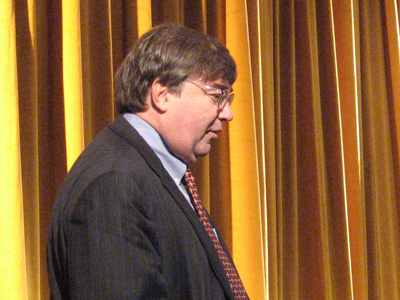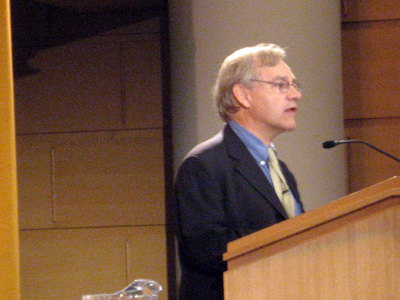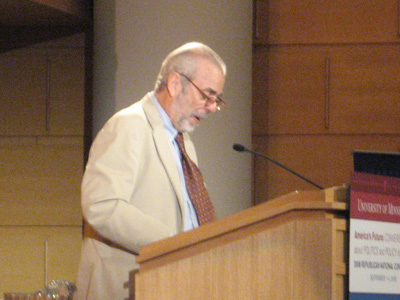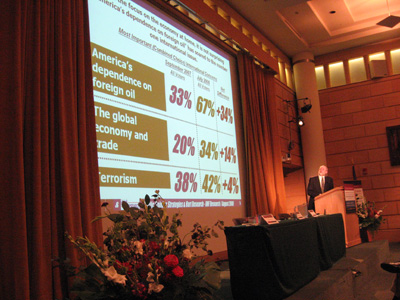The Republican National Convention gives political wonks a chance to engage in some interesting discussions. The Humphrey Institute at the University of Minnesota this week is holding several forums this week.
One of them — What are Americans Looking For — begins at 10 and features Charlie Cook (photo below) , the editor of the Cook Political Report; Andrew Kohut of the Pew Research Center and Bill mcInturff, co-founder of Public Opinion Strategies.

E.J. Dionne, Washington Post columnist, is moderating…

10:14 a.m. – We’re underway with introductions.
10:15 a.m. – Charlie Cook is up first. “Louisiana is known as the state in which half of it is underwater and the other half is under indictment,” he jokes.
10:17 a.m. “Studying voting patterns… is actually a detriment in this election rather than an asset because nothing is happening in a way you would have guessed.” He says this would be a difficult election for the GOP under any circumstances. You look at party ID, it’s different than the last elections. The Republicans shouldn’t have a chance in this election but “John McCain made some important deposits in the maverick bank years ago and now it’s time to make some important withdrawals.”
“I don’t know whether the selection of Palin was brilliant or insane. But it’s one or the other. There’s no in between.” Cook says the biography and narrative is there but he says he was talking to a guy who had three interviews for a job at Ruby Tuesday, which is more, apparently, than it took Gov. Palin to get the job..
10:22 a.m. Cook: “I thought experience made a big, big difference when people made a decision for president.” But experience has been devalued to the point where a Barack Obama could win a Democratic nomination. For that reason, he’s not willing to say the Palin pick is insane. “From the folks I talk to, Sen. McCain wanted desperately to pick Sen. Lieberman but when too many party leaders said ‘at best, you’ll have a walkout, at worst they’ll burn the building down if you pick Lieberman.’ He was so committed to making a pick that would shake things up that if you can’t pick Lieberman or Tom Ridge, Gov. Palin was the next choice.”
Cook says the race was so close that McCain didn’t need to do a “Hail Mary” pass. He says what we learn in this election year probably won’t have any lasting value; it’s that weird of a year.
10:25 a.m. “There’s not a single state in this country where John McCain is as organized as George Bush was four years ago. The idea that the Palin pick will grab Clinton supporters is “absurd.”
Next up: Andrew Kohut of Pew Research Center.

10:29 a.m. His top questions:
He says most soft supporters of McCain are moderates and “I’m not sure how Palin will play there.”
10:38 a.m. Bill McInturff, co-founder of Public Opinon Strategies is up next. He’s presenting the key findings of his latest survey.

He notes the transformation of the American voter since last summer. Then 47% said Iraq was the #1 issue, now it’s the economy and jobs (45%). “The $4 shock (of gasoline) has started to wear off,” however.
There’s been a 34% jump in concern about oil. What dropped? “Everything else,” according to McInturff.
Other findings:
Questions and Answers
Q: What’s up with the terrorism issue? What is its trajectory?
A: McInturff: It has residual power in New York and Washington because “we were attacked.” The rest of the country, he says, has moved on.
Q: The terrorism issue has appealed more to Republicans in the past. Is that still the case?
A: Kohut: The GOP has lots its advantage on the issue. But then he says McCain has a larger advantage in the polls than Bush did at this time in 2004. But peoples’ minds are on other issues.
Q: Do we have a new “normal” being formed? (i.e. record turnout among young and African Americans)
A: Cook: “Whenever I hear people say, ‘things will never be the same again,’ I just yawn. 9/11 was going to change American politics forever. I don’t buy it. I do think the combination of President Jimmy Carter and Ronald Reagan turned 1 – 1 1/2 generations to the Republican Party. What I wonder is whether President Bush has pushed a generation away from the Republican Party.”
McInturff: “There’s a huge capacity of young people to increase their percentage of the turnout and I believe, especially with Latinos, they’re going to do that. People vote when they’re mad and when they’re mad, they vote to fix it. Then they tend to disappear. I’m not convinced we’re seeing some sustainer of new young votes. We realign based on what works.”
Cook: “Over the long haul, it’s a long haul.”
Q; How much do we know about what happens to Hillary’s voters?
A: McInturff: About a third of Clinton Democrats are very hesitant about voting for Sen. Obama. They are white, tend to be less well educated, have middle income, but the gender isn’t women. 55% of these are men.
Dionne: 6% of Clinton Democrats would’ve vote for McCain, even in a matchup between Clinton and McCain.
Kohut: Says the majority of disaffected Hillary supporters are women.
Cook: “I think if you wanted to woo Hillary votes, you (McCain) would have gone somewhere else.” Says the Plain pick was just intended to do something “out of the box and give the finger to the establishment.”
Q: What’s going to happen?
A: Kohut: I can’t imagine it being a McCain blowout. If he wins, it’ll be close.
McInturff: Health care will again be pushed off the national agenda. Obama could win by more than Hillary could. He also could lose by more than Clinton would.
Cook: It’s like a stool for Obama. One leg is African Americans, one is Hispanic, one is whites under 50 or college educated. The one place where Obama is underprforming is whites over 50. A stool can stand on three legs. It’s not very stable; you can’t rely on it, but if it stays where it is, we’re going to a close race.
If Obama connects with whites over 50 of working-class whites, he could win big. But if not, it’ll be close.
== End. Now it’s time for your analysis in the comments section. ==
